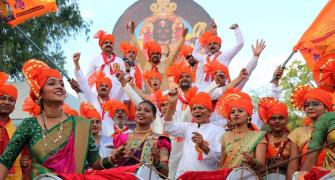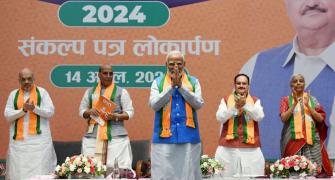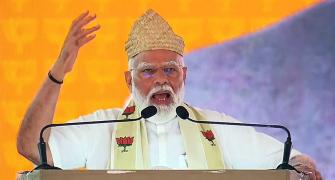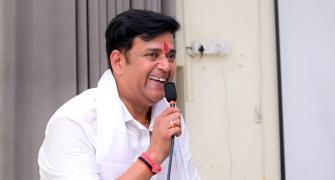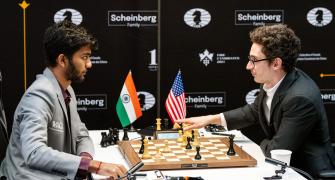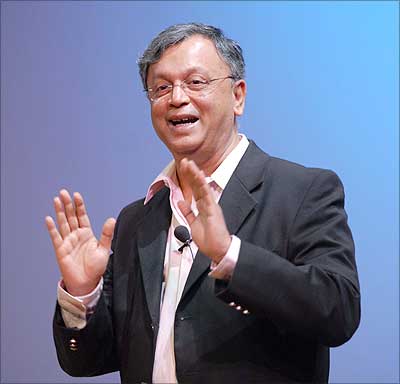 A team from Pratham had arrived at a village in Uttar Pradesh to assess if the children could read, but the village head was dismissive. Lying shirtless on his cot, he told them all children in the village attended school and that the exercise was futile.
A team from Pratham had arrived at a village in Uttar Pradesh to assess if the children could read, but the village head was dismissive. Lying shirtless on his cot, he told them all children in the village attended school and that the exercise was futile.
One of his sons, a third-grader who was loitering around, got curious. Seizing the chance, Pratham volunteers handed him a simple reading test paper, which he found he could not read. When his fifth and seventh grader brothers similarly floundered, the father sat up.
"Don't you go to school every day?" he asked. Then he put on his shirt and went around the village testing the other children. "He said: 'I've lost face. I've got to change something here'," Pratham founder Madhav Chavan narrated, in his address at the Asia Society on June 18. "This is the power of a simple test."

More than 200 people were present at the Asia Society's Lila Acheson Wallace Auditorium to hear him speak.
Dr Chavan did not speak from the podium, but casually walked around on stage, engaging the audience in an informative speech that employed humour to arouse interest. Sheila Hooda, senior managing director at TIAA-CREF who is a board member of Pratham Tristate, introduced him.
Dr Chavan founded Pratham -- a non-profit organisation that works in primary education across India -- in 1994 with seed grants from UNICEF, the Brihan Mumbai Municipal Corporation, and local businessmen. Today, its programmes reach remote corners of India, touching lives of more than 500,000 children every day.
Pratham was the first beneficiary of the partnership between the Bill and Melinda Gates Foundation and the William and Flora Hewitt Foundation to improve the quality of education in developing countries. Earlier this year, Google awarded it a grant to support its nationwide Annual Survey of Education Report.
Pratham conducted the survey in 2005 after repeatedly asking the Indian government to publish a Western-style report on the status of education in the country.
The government claimed that over 90 per cent of the children were attending school, but Pratham's experience said that even those who went to school could not read or perform simple arithmetic.
In October, it decided to lead the survey itself, and in about 100 days, it was completed covering most districts of India.
It found that 50 per cent of school-going children aged 6 to 14, numbering close to 100 million, could not read age-appropriate text or perform basic mathematics.
One might feel that southern India, registering IT-driven growth, might do better, but its performance was dismal compared to northern India.
Two years later, Pratham launched the Read India movement to help all children between ages 6 and 14 within and outside the school system achieve reading and arithmetic proficiency.
Read India is not just about teaching children to read and write; it is also about taking charge and not looking to the government to get things done.
"What would you do if you child was not reading? Go and complain to the school, fight with the teacher?" Chavan asked. "Or first regard what to do at home -- simple parental action?"
Since many parents in Indian villages either cannot read or provide an environment conducive to learning at home, Pratham asks local youths to volunteer their time and help these children.
It approaches an ordinary young man (no time is wasted in calling out to the best and the brightest) who has passed high school and is attending the local college.
"We tell him: you are fortunate. You've gone ahead. Many children around you are in the danger of not completing school. Would you like to help them?" Dr Chavan said.
Three months ago, his colleagues at Pratham reported that they were able to mobilise at least one such volunteer in approximately 350,000 villages. That is more than half of the 600,000 Indian villages.
There is no complex psychology behind the desire to teach. Dr Chavan was once showing a British hedge fund manager around a village in Uttar Pradesh when they encountered a young man teaching children under a tree.
When repeatedly asked why he was teaching, he said it was because he liked it. His family was perplexed by the question, because they hadn't given it much thought.
He had studied, so he could teach. Many of these Pratham volunteers teach for a couple of months, then hand over the reins to another person.
These young people, particularly the women, are often ignored in their village. When they suddenly become part of something huge, people begin respecting them and their self-esteem grows.
"If you visit Pratham, in slum communities or in villages, they will tell you: now I am somebody," Dr Chavan said. "This simple appeal to goodness is central to why Pratham is successful."
In the year 1930, Mahatma Gandhi walked almost 300 miles for 23 days and picked up salt, Dr Chavan pointed out.
Hundreds of thousands of people joined him, and it changed the history of India. "We tell these young people: you pick up a few books and read with the children around you. Hundreds of thousands will join you, and we will change the history of India once again."
Text: Monika Joshi
Image: Pratham founder Dr Madhav Chavan at the Asia Society



